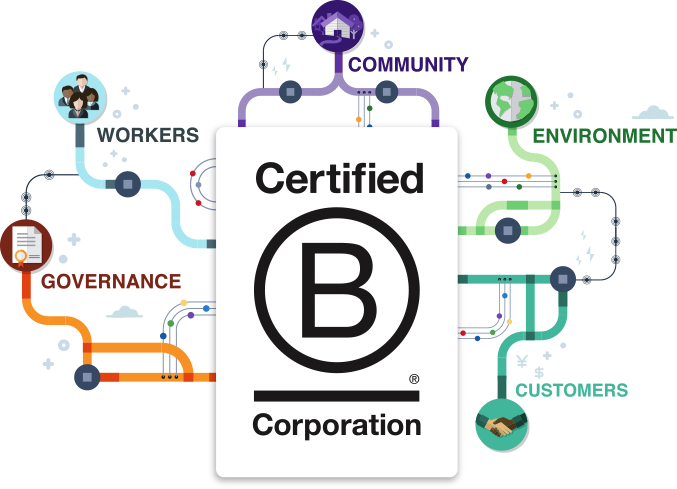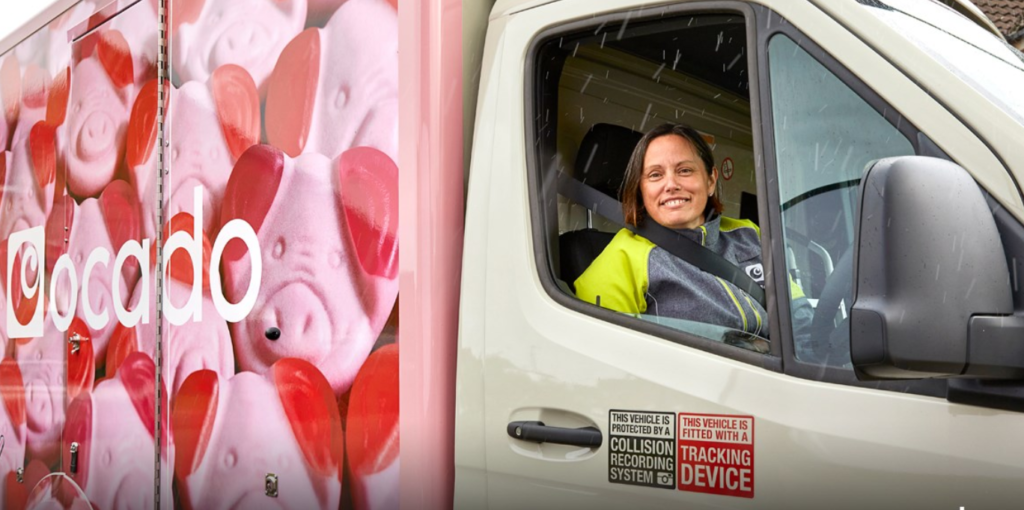Earlier in February the British online supermarket Ocado announced its intention to set up a dedicated virtual aisle in its store for products from companies that had achieved B Corp status.
Around 1,100 products from 35 sustainable companies made the cut including Ben & Jerry’s ice cream, Ella’s Kitchen, Cheeky Panda, Teapigs tea, Innocent smoothies, and Alpro’s non-dairy milk alternatives.
Jo West, head of sustainability retail for Ocado said “We’re delighted to be making greener choices easier for Ocado customers by gathering all these amazing brands that have made a commitment to building a more sustainable future, in one easy-to-find place.”
Yet it left some industry observers scratching their heads a little. Why was Ocado highlighting to consumers what is ostensibly a b2b standard? For others, there is very little understanding of what B Corp status is and why companies want to sign up to it.
What then is B corp status?
So will we see more companies try to champion B Corp credentials to the consumer? ‘What exactly is B Corp status and how does a brand attain it?’
Essentially B Corp status has been in existence now for around 15 years, though it has only recently started to gain mainstream traction. It is a certification that’s awarded to companies who its regulators believe have achieved certain social sustainability and environmental performance standards. They are businesses that, in theory, give as much consideration to their social and environmental impact as they do to their financial returns.
In order to attain B Corp status, a company has to submit to a rigorous online investigation of their business practices called the B Impact Assessment. This is in two parts. The first segment asks the business lots of questions about how they interact with their workers, customers, community, and environment. The second part is a Legal Requirement Tool to determine how the company can integrate stakeholder consideration into its governance structure. The idea being that if B Corp status and its doctrines are enshrined in company law then the business and its shareholders (if it has any) are duty-bound to continue to live up to those expectations.
What the B Corp organisation is looking for ultimately is outlined on their website
Corporations and leaders
- That we must be the change we seek in the world.
- That all business ought to be conducted as if people and place mattered.
- That, through their products, practices, and profits, businesses should aspire to do no harm and benefit all.
- To do so requires that we act with the understanding that we are each dependent upon another and thus responsible for each other and future generations.
The questionnaire is split into different sections
Governance – corporate accountability and transparency
Workers – level of legal, rights, training and education etc
Community – job creation diversity and inclusion. A wider relationship with the wider community
Environment – essentially carbon footprint
Customers – support for purpose-driven enterprises etc
The businesses are scored for each section and if they reach a total of 80/200 they are awarded B Corp status. Naturally, not all businesses that apply make the cut.
There is an annual fee, the size of which is dependent on how large the business is and the status has to be renewed every three years.

So why strive for B corp status?
Companies become certified for a number of reasons. There are obvious external ones such as being part of the global movement for change and helping a company to stand out in sustainability and social issues. Yet there are also internal ones, such as setting a company on a certain path. In the future too B Corp status might be crucial in attracting talent as individuals look for companies that mirror their own view of the world.
There is growing evidence too that B Corp companies cluster together and may choose to work with companies with the same aspirations. Something that could be very useful from a business generation perspective.
Dave Vann, Managing Director of ABA – a creative & strategy agency working with purposeful companies believes that there are two main B Corp accreditation can really make a difference.
“It is especially useful where the business has to fight common industry perceptions – the fashion industry is a great example of this. B Corp status makes sense for brands like Patagonia, Allbirds or Wanderlust – because the reality is that a default assumption in many people’s eyes is “I bet some poor kids in a sweatshop somewhere helped to make those shoes.” In this example, the B Corp mark is really there to say to customers (B2B and B2C) – “We really are one of the good guys.”
More generally Dave Vann believes that status matters where purpose is an inherent part of the proposition. This is especially true in the agency & consulting worlds as companies seek to underline their credentials to differentiate themselves from their rivals.
“If you are positioning yourself as the brand that can help you (B2B business) discover greater purpose or communicate with greater purpose, those three fingers quickly point back at you! Hence the high propensity of ad agencies signing up as B Corps.”
Who has signed up so far?
There are currently over 3,500 Certified B Corporations in more than 70 countries. The UK number is around 340. Many are companies that have in the past touted green credentials like Innocent and Ella’s Kitchen. As you’d expect, there are also companies in the ‘green business world, such as consultant ClimateCare. More recently there is a trend for finance companies and creative /communication agencies such as Don’t Cry Wolf and Organic.
Finally there are the consumer-facing companies, the most recent of which are Camden Town Brewery, Dear Green Coffee, Pala eyewear Danone water and cosmetics company Herb UK.

Is B-corps status solely a b2b certification?
The official answer is ‘No,’ it just feels that way at the moment as recognition of B Corp status is so low among consumers. However we might be reaching a tipping point for B Corp in the b2b world – and ironically that represents quite a large number of consumers.
While there are still thousands of executives across the country who have no idea what the term means, they may end up learning about it this year. That could lead them on to thinking about how products from B Corp companies fit into their private lives.
Ultimately for the time being B Corp has much greater benefits from a b2b perspective.
Carlos Miranda, co-founder of three B Corps including Lightful, a B-Corp for Tech for Social Good company where he is currently Chairman, suggests “B Corp status gives you an edge from a marketing and sales perspective if you’re looking to work with other B Corps.”
“There is now a place where companies can meet and explore working with other B Corps. The creator of B Corp, B Lab, has created a community called the B Hive which is used extensively as a place to source products and services from like-minded businesses,” explains Miranda
Dave Vann MD of ABA adds “For any business that wants to be seriously considered as an ethical or purposeful choice in their sector, there is increasingly an expectation that there will be evidence to support these words. The easiest way to prove these credentials? B Corp status – of course.”
Do consumers have any understanding of what B-corp status is?
If awareness of B Corp status is low in the business community it is virtually non-existent among consumers. The Ocado initiative and others that are sure to follow will begin to change this.
Further B-Corp Consumer is set to launch in March 2021 with the aim of starting to increase awareness among the wider public
Laura Crawford, Founder of Mama Bamboo, an award-winning eco-friendly disposable nappy company thinks that expansion to target a wider audience is key.
“It is so important for all eco / ethical labelling to get better known and understood. It’s a very confusing marketplace and there’s plenty of room for greenwashing at the moment.
A certification such as B-Corp really needs more brand awareness as it does denote those few companies who really go above and beyond to ensure their whole business and their products are ethically and environmentally sound.”
It’s a view that chimes with Jessica Kruger the founder of LUXTRA a sustainable fashion brand that has attained B Corp status, she believes that “B Corp status lends itself so well to consumers facing B2C brands! There’s so much to talk about as a result of the certification. Our B Corp status has become a big part of our identity, so rather than our communication simply being “buy this new pink bag” we engage with customers by talking about bigger issues and add value to their lives through education. It leaves an impression.
Tim Burley, Head of Client Services at digital agency Organic, which was one of the first B-Corp certified agencies in the UK, thinks that it only a matter of time before consumers recognise B Corp status as being important but not necessarily in a way that will instantly win companies more customers.
“Consumers are definitely ready to support companies that make a positive impact in the world. B Corp status is a great way to make that commitment visible, while also helping businesses to measure their progress towards longer-term goals. Simply being a B Corp may not win you customers on its own, but it’s a great way to engage consumers by showing them the kind of business you are, and what you think is important.”
Carlos Miranda thinks that it really is only a matter of time before B Corp status goes mainstream, and that will occur when the media takes more notice of it.
“Consumers are becoming more conscious, especially the next generation. They are looking for goods that are ethically sourced or organically produced, for example, and are very aware of the environmental and societal impact of their spending habits.
So, while penetration in terms of general understanding remains low I fully anticipate this to change over the next few years as more household names join the club and the media continues to cover the value of B-Corp status.”
Dave Vann of ABA takes the view that the biggest obstacle to B Corp hitting those giddy heights is complexity. The mark and movement – what it stands for, what it stands against – is both broad and pretty complex.
“B Corp lack a focused, ‘campaignable’ message that Fair Trade (tackling the injustices that producers of our products face) or Make Poverty History (eradicate extreme poverty from the globe) had at their height of their popularity, or which the likes of the Living Wage Foundation or Rainforest Alliance have built around their marks,” he argues. “The B Corp message is, at its core, a really rather nuanced B2B message – simultaneously its biggest strength and greatest weakness.”
Conclusion
2021 is likely to be a big year for the B Corp movement. On a macro level growing concerns about climate change and maybe even the causes of the Covid19 pandemic, will push environmental issues to the fore. In the UK in particular it will hit new levels when the country hosts the next Climate Change Conference in Glasgow in November.
Companies will increasingly be judged by their commitment to purpose as well as profit and that is where B Corp clearly has a role.
It seems quite likely too that its appeal to consumers will initially stem from its awareness in the business world, as executives who champion it in their business lives look for companies that have the same status when they visit their supermarkets.
The way in which B Corp status is integrated into corporate law is also likely to become a big discussion point this year. In some ways companies really ought not to need an external organisation to aid them to set out their vision of ‘purpose’
The final word goes to Carlos Miranda “My vision is that one day there is no longer a need for B-Corps and rather it is standard practice for organisations to go through the process of what is required to achieve B-Corp status.”




